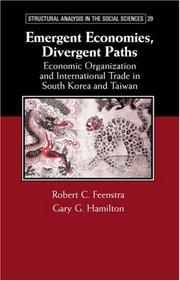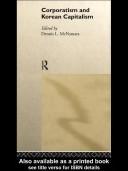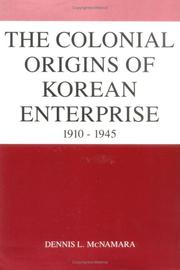| Listing 1 - 7 of 7 |
Sort by
|

ISBN: 113446939X 1280056010 0203219414 0415278651 0203295463 0429229925 9780203219416 9780415278652 9781134469390 9781134469345 9781134469383 1134469381 Year: 2003 Volume: 42 Publisher: London New York RoutledgeCurzon
Abstract | Keywords | Export | Availability | Bookmark
 Loading...
Loading...Choose an application
- Reference Manager
- EndNote
- RefWorks (Direct export to RefWorks)
The 1997 South Korean financial crisis not only shook the country itself but also sent shock waves through the financial world at large. This impressive book critically assesses the conventional wisdom surrounding the Korean crisis and the performance of the IMF-sponsored reform programme.Looking first at the strengths and weaknesses of 'Korea Inc.' in comparison with other East Asian countries, the authors describe the challenges faced by Korea in the 1990s due to the acceleration of globalization. By arguing that the transition attempted by Korea was badly conceived and ill designed,
Big business.
---
Conglomerate corporations.
---
Conglomerate corporations - Korea (South).
---
Financial crises.
---
Industrial policy.
---
Conglomerate corporations
---
Big business
---
Financial crises
---
Industrial policy
---
Industrial Management
---
Management
---
Business & Economics
---
K9410
---
K9400.80
---
K9450
---
Korea: Economy and industry -- organization and systems
---
Korea: Economy and industry -- history -- modern period, postwar period (1945- )
---
Korea: Economy and industry -- commerce and trade
---
Conglomérats (Economie politique)
---
Grandes entreprises
---
Crises financières
---
Politique industrielle

ISBN: 0521622093 9780521622097 9780511499586 9781107634510 0511168918 9780511168918 0511166389 9780511166389 0511167970 9780511167973 0511168489 9780511168482 0511499582 1107142423 1280436840 0511167423 0511312318 1107634512 Year: 2006 Publisher: New York Cambridge University Press
Abstract | Keywords | Export | Availability | Bookmark
 Loading...
Loading...Choose an application
- Reference Manager
- EndNote
- RefWorks (Direct export to RefWorks)
The economies of South Korea and Taiwan in the second half of the twentieth century are to scholars of economic development what the economy of Britain in the late eighteenth and early nineteeth centuries is to economic historians. This book, first published in 2006, is a collaboration between a leading trade economist and a leading economic sociologist specializing in East Asia, and offers an explanation of the development paths of post-World War II Korea and Taiwan. The ambitions of the authors go beyond this, however. They use these cases to reshape the way economists, sociologists, and political scientists will think about economic organization in the future. They offer nothing less than a theory of, and extended evidence for, how capitalist economies become organized. One of the principal empirical findings is that a primary cause for the industrialization of East Asia is the retail revolution in the United States and the demand-responsiveness of Asian manufacturers.
Korea (South) --- Taiwan --- Economic conditions. --- Economic conditions --- Commerce. --- K9400.80 --- K9410 --- K9460 --- S26/0750 --- Korea: Economy and industry -- history -- modern period, postwar period (1945- ) --- Korea: Economy and industry -- organization and systems --- Korea: International trade and economic relations (South) Korea -- world and transregional --- Taiwan--International economic relations and trade --- Economic history. --- History, Economic --- Economics --- Social Sciences --- Sociology

ISBN: 1134636903 1280333359 9786610333356 0203257995 0203021878 0415200520 9780203257999 9780415200523 9780203021873 9781134636853 9781134636891 9781134636907 Year: 1999 Publisher: London Routledge
Abstract | Keywords | Export | Availability | Bookmark
 Loading...
Loading...Choose an application
- Reference Manager
- EndNote
- RefWorks (Direct export to RefWorks)
Corporatism and Korean Capitalism employs corporatist theory to examine the Korean experience of state-business ties. It includes theoretical chapters on Asian and Korean corporatism, case studies of agriculture, industry and industrial relations and an introduction to comparative corporatism. It helps to push the study of Korean political and economic change from description on to theoretical analysis.This volume will challenge researchers and students of Asian studies, economics and politics to extend and refine their understanding of both corporatism and Korea. Moreover, this
Industrial policy --- Corporate state --- Capitalism --- Korea --- Politics and government. --- Market economy --- Corporations (Corporate state) --- Corporatism --- Corporative state --- Corporativism --- State, Corporate --- -Corporate state --- -K9409 --- K9410 --- K9401.10 --- K9413.10 --- Korea: Economy and industry -- organization and systems --- Korea: Economy and industry -- policy, legislation, guidelines, codes of behavior --- Korea: Economy and industry -- relations -- state --- Economics --- Profit --- Capital --- Political science --- Syndicalism --- Fascism --- Functional representation --- K9409 --- Korea: Economy and industry -- theory, methodology and philosophy
Book
ISBN: 8973006460 9788973006465 Year: 2005 Publisher: Seoul Ewha womans university press
Abstract | Keywords | Export | Availability | Bookmark
 Loading...
Loading...Choose an application
- Reference Manager
- EndNote
- RefWorks (Direct export to RefWorks)
Small business --- Business and education --- Employees --- Training of --- -Business and education --- K9410 --- K9415 --- Corporations and education --- Industry and education --- Education and business --- Education and corporations --- Education and industry --- Education --- Worksite schools --- Businesses, Small --- Medium-sized business --- Micro-businesses --- Microbusinesses --- Microenterprises --- Small and medium-sized business --- Small and medium-sized enterprises --- Small businesses --- SMEs (Small business) --- Business --- Business enterprises --- Industries --- -Training of --- -Case studies --- Korea: Economy and industry -- organization and systems --- Korea: Economy and industry -- business methods and management --- Size --- Small business - Employees - Training of - Korea - Case studies --- Business and education - Korea - Case studies

ISBN: 0691116334 0691057052 1400824206 1283134659 9786613134653 1400814316 9781400814312 Year: 2001 Publisher: Princeton Princeton University Press
Abstract | Keywords | Export | Availability | Bookmark
 Loading...
Loading...Choose an application
- Reference Manager
- EndNote
- RefWorks (Direct export to RefWorks)
This book challenges the widely accepted notion that globalization encourages economic convergence--and, by extension, cultural homogenization--across national borders. A systematic comparison of organizational change in Argentina, South Korea, and Spain since 1950 finds that global competition forces countries to exploit their distinctive strengths, resulting in unique development trajectories. Analyzing the social, political, and economic conditions underpinning the rise of various organizational forms, Guillén shows that business groups, small enterprises, and foreign multinationals play different economic roles depending on a country's path to development. Business groups thrive when there is foreign-trade and investment protectionism and are best suited to undertake large-scale, capital-intensive activities such as automobile assembly and construction. Their growth and diversification come at the expense of smaller firms and foreign multinationals. In contrast, small and medium enterprises are best fitted to compete in knowledge-intensive activities such as component manufacturing and branded consumer goods. They prosper in the absence of restrictions on export-oriented multinationals. The book ends on an optimistic note by presenting evidence that it is possible--though not easy--for countries to break through the glass ceiling separating poor from rich. It concludes that globalization encourages economic diversity and that democracy is the form of government best suited to deal with globalization's contingencies. Against those who contend that the transition to markets must come before the transition to ballots, Guillén argues that democratization can and should precede economic modernization. This is applied economic sociology at its best--broad, topical, full of interesting political implications, and critical of the conventional wisdom.
Industrial organization --- Organizational change --- International economic integration. --- Industrie --- Changement organisationnel --- Intégration économique internationale --- Organisation, contrôle, etc. --- Intégration économique internationale --- Organisation, contrôle, etc. --- Argentina --- -Organizational change --- -Industrial organization --- K9410 --- Korea (South) --- Korea: Economy and industry -- organization and systems --- #A0504SO --- Common markets --- Economic integration, International --- Economic union --- Integration, International economic --- Markets, Common --- Union, Economic --- International economic relations --- Change, Organizational --- Organization development --- Organizational development --- Organizational innovation --- Management --- Organization --- Manpower planning --- Industries --- Industrial concentration --- Industrial management --- Industrial sociology --- International economic integration --- Sociology of organization --- Organization theory --- South Korea --- Spain

ISBN: 0521385652 0521032083 0511528108 Year: 1990 Publisher: Cambridge Cambridge University Press
Abstract | Keywords | Export | Availability | Bookmark
 Loading...
Loading...Choose an application
- Reference Manager
- EndNote
- RefWorks (Direct export to RefWorks)
South Korean conglomerates, or 'chaebol,' such as Hyundai and Samsung, play a far more important role in the Korean economy than do comparable large firms in the US and Japanese economies. Despite the importance of the chaebol to the rapid postwar development of the Korean economy, little has been written about their origins during the Japanese occupation. Through case studies of local ownership in major financial, commercial, and industrial ventures, this book provides a detailed picture of indigenous capitalism during Japanese colonization. Drawing on Japanese government sources, Korean biographies and diaries, interviews and US intelligence material, the author gives a compelling account of key personalities in the Korean business elite and of the personal dilemmas of balancing nationalism against success under dependent, colonial conditions. The author concludes that dependent rather than comprador capitalism characterized leading Korean businesses through 1945. Patterns of concentration within family enterprises, close ties with the colonial state, and mutual support among a Korean inner circle of business leaders constitute a legacy of the colonial period important to the subsequent development of Korean conglomerates.
History of Asia --- anno 1900-1999 --- South Korea --- Corporations --- -K9400.70 --- K9410 --- K9170 --- Business corporations --- C corporations --- Corporations, Business --- Corporations, Public --- Limited companies --- Publicly held corporations --- Publicly traded corporations --- Public limited companies --- Stock corporations --- Subchapter C corporations --- Business enterprises --- Corporate power --- Disincorporation --- Stocks --- Trusts, Industrial --- History --- -Korea: Economy and industry -- history -- Japanese annexation period (1905-1945) --- Korea: Economy and industry -- organization and systems --- Korea: History -- Japanese annexation period (1905-1945) --- Korea --- Economic conditions --- -History --- -Corporations --- -History of Asia --- K9400.70 --- Korea: Economy and industry -- history -- Japanese annexation period (1905-1945) --- Japan --- Korea [South ] --- 20th century --- 1910-1945 --- Japanese occupation, 1910-1945 --- Corporations - Korea (South) - History - 20th century. --- Korea - Economic conditions - 1910-1945. --- Korea - History - Japanese occupation, 1910-1945. --- Social Sciences --- Political Science
Book
ISBN: 9781780687131 1780687133 9781780688404 1780688407 Year: 2019 Publisher: Cambridge Intersentia
Abstract | Keywords | Export | Availability | Bookmark
 Loading...
Loading...Choose an application
- Reference Manager
- EndNote
- RefWorks (Direct export to RefWorks)
This book brings together foreign investment and investment arbitration in Asia. It provides a critical analysis of foreign investment, its benefits and the legal regimes of the jurisdictions studied at a time when investor-state disputes are on the rise and investment arbitration is under growing scrutiny. Governments are under greater pressure to balance the promotion of investment with public policy development and interests and calls for a permanent court for investment arbitration are getting louder.0To assess future possibilities, this book takes stock of, brings together and analyses the legal regimes on foreign investment in 12 major Asian jurisdictions, namely China, Hong-Kong, India, Indonesia, Japan, South Korea, Malaysia, Myanmar, Philippines, Singapore, Thailand and Vietnam. These constitute paradigmatic examples of what is happening in the legal framework of Asian foreign investment and the impact that the current system of investment arbitration has in all of them. The analysis shows the existence of changing positions and degrees of openness towards foreign investment in the region, as well as a distinct level of exposure to and involvement in investment arbitration.
Internationale financiën --- Vreedzame regeling internationale geschillen --- Economisch recht --- Azië --- Investissements étrangers --- Arbitrage (droit) --- Arbitrage commercial international --- Droit --- J4540 --- J4414 --- J4750 --- Japan: Economy and industry -- commerce and trade -- international trade, economic relations and policy --- Japan: Economy and industry -- industrial organization and relations -- mergers and acquisitions, industrial finance --- Japan: Law and jurisprudence -- commercial law --- International finance --- Peaceful settlement of international disputes --- Economic law --- Asia --- Investments [Foreign ] --- International centre for settlement of investment disputes --- Investments, Foreign (International law) --- Arbitration (International law) --- K9460 --- K9410 --- K9582 --- Korea: International trade and economic relations (South) Korea -- world and transregional --- Korea: Economy and industry -- organization and systems --- Korea: Law and jurisprudence -- specific topics --- Investments --- Investissements --- Investissements étrangers (Droit international) --- Arbitrage international --- Investments, Foreign --- Arbitration agreements, Commercial --- Arbitration clauses, Commercial --- Commercial arbitration agreements --- Compromise (Arbitration agreement) --- Submission (Arbitration agreement) --- Arbitration and award --- Law and legislation
| Listing 1 - 7 of 7 |
Sort by
|

 Search
Search Feedback
Feedback About UniCat
About UniCat  Help
Help News
News